In Quedlinburg's main square, tourists and locals brave the pale winter sunshine, clinging to beams of light that provide meagre warmth on the al fresco lunchtime tables.
The town is blessed with a rich history, as attested by the UNESCO-approved half-timbered houses dating from the 10th and 11th centuries. King Henry the Fowler was crowned here by Franconian nobles in 919, earning the trading centre the honorary and resonant title of Cradle of the German Reich.
Not far from the Quedlinburg castle is a former prison today used as a food bank by AWO, a nonprofit agency that plays an outsized role in the life of the town.
There are nine distribution centres in all. AWO brings food, clothing or vouchers to 2,000 families (from a total population of 24,000) provided by bakeries, butchers, supermarkets, Amazon-leftovers and it's all managed by a small army of donors, partners, supporters and volunteers.
"We have a high percentage of unemployed people, we have declining industries," says Anke Schleritt, deputy managing director of AWO.
That a wealthy-looking town in Germany, bar far the biggest and most prosperous country in Europe, has such a thriving food bank industry goes some way to explaining the rise of the Alternative for Germany (AfD) in the former east Germany.
"There is the feeling that people are no longer being listened to, that politics is very remote," says Schlerrit. "There's the issue of irregular migration. The AFD say they're precisely catering for these people, who are being left behind by the system, who cannot make ends meet. It's very easy for the AFD to exploit these emotions."
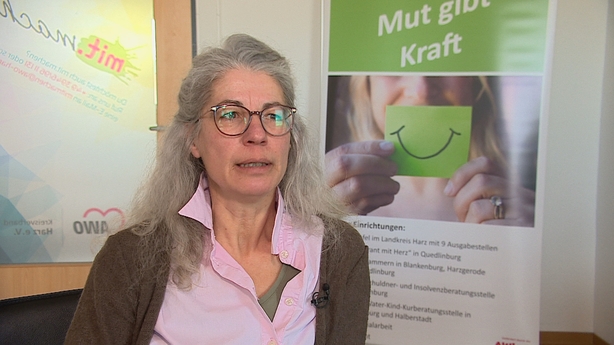
Quedlinburg, not far from the Harz mountains in Saxony-Anhalt, is typical of the de-industrialised former east Germany.
The current problems stem from Germany’s stagnant economy - in recession now for two years - exacerbated, perhaps like in no other EU member state, by the war in Ukraine.
The end of cheap Russian gas has hit energy intensive industries hard. While inflation has fallen in Europe from the highs of the pandemic, it feels persistent in Quedlinburg.
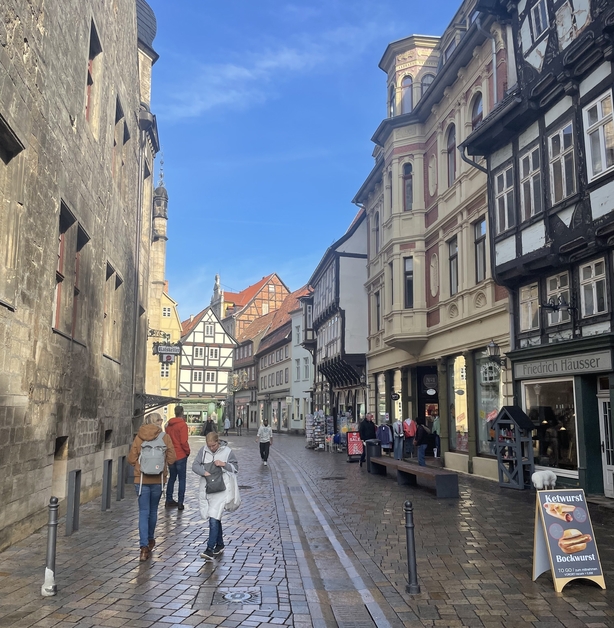
"The money just isn't sufficient anymore. Inflated costs haven't gone down," says Schleritt. "In the near future there will be fewer young people living here who can actually make a living, and to generate tax revenue. There are many people on the minimum age, so that creates households which rely on food banks as well as shopping in discount supermarkets."
There is a pervasive sense that even 35 years after reunification, the former GDR is hard done by and resentful at the west, a grievance which appears to have benefitted the AfD.
It underpins a sense that the established parties - the Social Democrats (SPD) and Christian Democrats (CDU) - have abandoned ordinary voters in hardscrabble parts of the old east.
Kay Uwe Ziegler, the AfD MP for nearby Sangerhausen, expects the party to win upwards of 35%.
I meet him at a small AfD rally in the town square. At the lower end of the square there is a very noisy counter demonstration by a blend of left wing and evangelical groups - both sides roar insults at each other across a cobbled no-man's land fenced off by police in riot gear.
"Here, in terms of industry and unemployment, it's in a very bad state. People have had enough of this economic situation," says Ziegler.
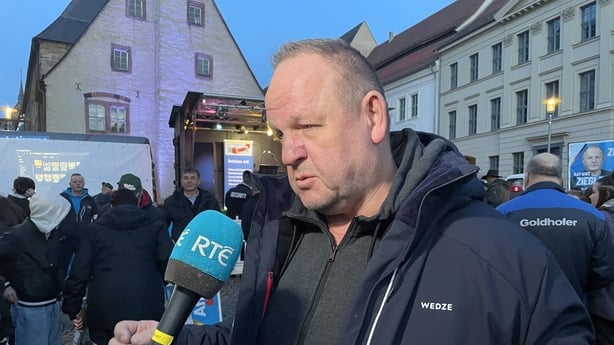
"What they tell us is we're lacking skilled labour, that's the narrative of the established parties. But when you look at the statistics there are a lot of unemployed people, and there are very few openings.
"What we’re missing are really good jobs, and we're lacking traineeships and above all, training for adults, so they can retrain, and can enter the labour market. That’s what we need and that’s what the old parties aren’t delivering."
Anke Schleritt recalls turning 18 when the Berlin Wall came down. Her father was a mechanic and her mother a nurse, and within the constrained Communist system they at least had a house and a regular income.
Saxony-Anhalt had specialised in engineering, seed production and textiles under the GDR, so when reunification happened there was an upwelling of startups providing parts for the big German carmakers, Audi, Volkswagen, BMW.
Those who worked in textiles had experience in working with plastics and were able to develop those skills. "We felt free in the beginning, we could connect with each other, collaborate globally," recalls Schleritt.
Then the big automotive giants changed their pricing structure for locally produced accessories. EU enlargement brought a clutch of new eastern European countries into the single market who excelled at producing parts more cheaply. A plan to sell plant seeds to Africa fell through.
Industries started to disappear.
The Quedlinburg hinterland is today populated by people trying to make ends meet with two, even three, small time jobs, while inflation cuts away at disposable income.
"We couldn’t sustain the economy, people became indebted," says Schleritt. "Today they still feel betrayed. There’s a sense of moral downfall. Today people don’t feel anything is changing for them, but they can’t articulate what they want.
"It's that unarticulated anger that the AfD is able to exploit."
Opponents are highly critical of the AfD's ability to harness these deep-seated grievances.
The party’s co-leader Alice Weidell has promised big tax cuts and large increases in public spending. She recommends Germany consider leaving both the European Union and the single currency.
"The AfD attracts a very ideological pool of voters who don't bother too much about the details of economic policy," says Peter Matuschek from the Forsa Polling Institute.
"Instead, they identify with the AfD as being an outsider, an anti-establishment party. Everything that suits this image is welcomed. The AfD programme, especially on economic policy, has many shortcomings, but we don't really see most AfD voters caring about this."
Matuschek estimates that between 10-12% of German voters adhere to extreme right-wing views, suggesting that the current 21% polling estimates for the party reflect a drift from established parties on the centre right and centre left.
Whether they stay with the party after this election remains to be seen. But there’s no doubt the AfD’s arrival in the Bundestag in 2017 dramatically upended the normally restrained political culture, with the chamber becoming a harsher debating space.
In January, after an Afghan asylum seeker with psychiatric problems fatally stabbed a toddler and adult in Aschaffenburg, Bavaria, Friedrich Merz, the CDU leader, sponsored a bill to close Germany's borders to irregular migration and to end family reunification, relying on the support of the AfD.
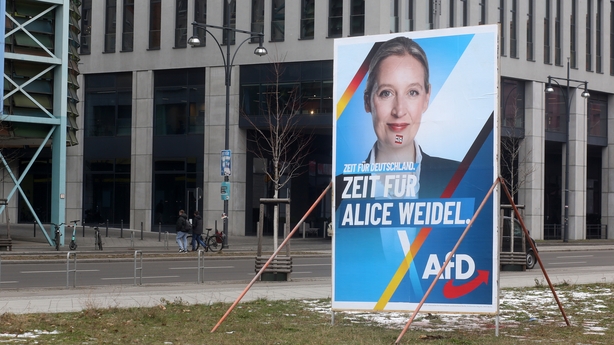
There was uproar in the Bundestag as it had ended the firewall the traditional parties have placed around the far-right, but the move generated even greater dismay across the country (or at least its western part).
In Munich, 250,000 people turned to to vent their anger at Merz's apparent willingness to sup with the devil. Even the highly reticent former chancellor Angela Merkel went public to say it was "wrong".
"The radical right-wing has become much louder," says Matuschek, "but the problem is, and this remains to be seen after the election, whether the traditional parties will become infected more by this virus of polarisation between the parties of the sector, as we saw some weeks ago, and with vast majority of Germans longing for more consensus within the traditional boundaries."
Critics of the AfD say that Weidell has not made any real attempt to make the party more moderate, in contrast to Marine Le Pen’s mission to soften the image of her own far-right National Rally in France.
The party is frequently pro-Russia, although in TV debates Weidell has said Germany should be "neutral" on the issue of the Kremlin’s invasion of Ukraine.
When AfD MP Hӧcke used a banned Nazi slogan and was prosecuted, Weidell initially called on him to be expelled from the party but has since appeared content that he remain.
The AfD speaks about "re-migration" which critics suggest really means mass deportation of foreigners.
In Sangerhausen, Kay Uwe Zeigler, the AfD candidate, denies the party is racist.
"Personally, I’ve worked over 30 years in the retail industry, selling textiles, and I have so many friends who are in foreign countries. When they hear that I'm supposed to be racist they laugh and say that's bulls**t.
"I don’t know any racists in the party. We have one problem: people who come here who call themselves asylum seekers or refugees. They live here, but make no effort to work and integrate themselves and play their part in Germany."
Professor Hajo Funke, of the Otto-Suhr Political Science Institute, strongly disagrees.
"In terms of strategy, they are utterly right-wing, extremist, racist. They mean it. They're against migrants. If they came to power they would oust millions. It's racism, especially against migrants, but it's also disappointment, even rage, against the democratic parties who are in power."
The party has said Germany should move on from guilt over the Holocaust, with one party member criticising the existence of the Holocaust Memorial in central Berlin.
"The AfD is eager to address again this phase of our history," says Professor Funke, "the Björn Hӧcke faction and those around him, including Alice Weidell. Of course, they're libertarian in economics, but they are not liberal. You see it in the election campaign, hateful arguments against migrants, against so-called illegal migrants, Syrians, Afghans and so forth. It's against international law. It's against the law with respect to asylum in Germany."
Critics say the AfD has pushed the centre of political gravity to the right, with the CDU using much stronger language on migration.
The man expected to become Chancellor, Friedrich Merz, has pushed against Angela Merkel’s shift to the centre, especially around migration.
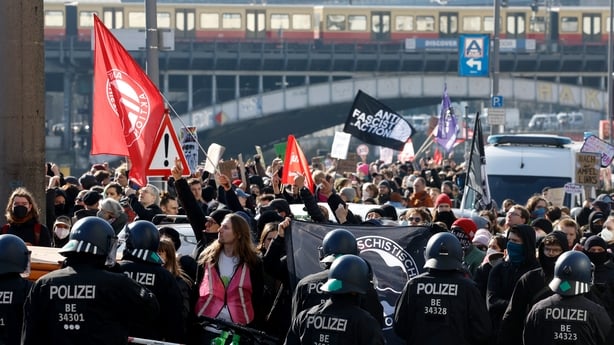
A 69-year-old corporate lawyer and financier multi-millionaire, he has run a campaign on the promise of repairing Germany’s "broken" economic model. Simply put, Europe’s economic powerhouse enjoyed twenty years of prosperity, geographically at the heart of beneficial supply chains, cheap and plentiful Russian gas, and a Chinese export market hungry for German cars.
In the past decade, however, Germany has had to take on around a million migrants fleeing the Syrian civil war, endure a pandemic, the end to Russian gas, and the curtailing of the Chinese market.
Add to that an aging population, crumbling infrastructure, and now potentially devastating US tariffs on its automotive sector, it is no wonder Sunday’s election is being described as the most critical in recent memory.
Merz has promised to slash bureaucracy, pare back net-zero regulations, boost R&D spending and cut welfare benefits. "A strong economy is the basis for everything - for a good social policy and a good environment," he said when launching his campaign in November.
"Without a good economy, nothing works...We want to get Germany back on the growth path."
Overshadowing Germany’s economic malaise is the debt brake.
Following the pandemic, the outgoing SPD-Green-Liberal coalition attempted to use €60 billion in unspent Covid funds but was dramatically over-ruled by the Constitutional Court on the basis that it breached Germany’s long established debt brake.
There is a consensus at national and EU level that if the continent is to meet growing defence spending needs, due to the Russian threat, then Germany - and Europe - will have to borrow more, and that the debt brake is an unacceptable hindrance to the economic medicine.
Merz has hinted he is open to the idea, but prefers other solutions, especially domestically driven growth.
Yet, the German heartland which he represents - the Mittelstand of SME's in small industries feeding the classic export boom - is facing existential problems due to soaring energy costs and the fall off in exports to China.
"There has been a very clear majority among Germans in favour of the debt brake," says Peter Matuschek of Forsa.
"This is strongly in line with the German sentiment that we shouldn't spend more than we have. However, this has changed considerably in the past six months. We now have a majority in favour of - not abolishing the debt break altogether - but to modify it to allow for more investment."
Friedrich Merz is expected to win 30% meaning he will lead a coalition, most likely with the SPD or even the Greens.
However, Die Linke (the Left) has seen a surge in support in recent weeks, meaning it will breach the threshold for entry into the Bundestag.
That in turn will fragment the next parliament and complicate Merz's agenda - changing the debt brake requires a two-thirds majority.
The election, dramatic enough as it is, has been overshadowed by the stunning collapse in the western alliance and President Donald Trump's alignment with Russia's war aims.
That the AfD has a two way love affair with the Trump administration - and its chief ideologue Elon Musk - means the stakes tomorrow could not be higher.







